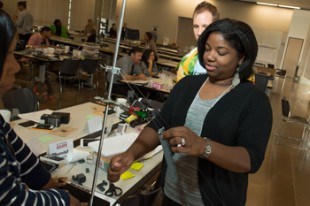A group of teachers gathers around a collection of brightly colored boxes spread on a table. They pick the boxes up, examine them, shake them, make note of their appearance and the sounds they make. A teacher offers new vocabulary to describe the objects and their behavior — woodles, fekah, squidge, tipoo.
In another room, a group of teachers is simply given a list of those vocabulary words and written definitions.
When the two groups are quizzed on the vocabulary afterward, the teachers who experienced the objects in context rather than just reading about them scored better.
The lesson? Learning is richer and more lasting for those who have a hands-on experience.
This was one of many “aha” moments for 30 math and science teachers from several Houston-area middle schools who attended Rice’s ConocoPhillips Applied Math Program (AMP) summer training on campus last week.

Lego blocks and pulleys were used to show middle school science and math teachers how they can demonstrate how elevators work. (Photo by Jeff Fitlow)
Based on the successful ConocoPhillips Rice Elementary Model Science Lab that has been inspiring the next generation of scientists in Houston-area elementary schools for seven years, AMP aims to improve science, technology, engineering and math — also known as “STEM” — teaching and learning in Houston-area middle schools by providing stimulating professional development for teachers and motivating learning experiences for their students.
Fifteen pairs of teachers in the Houston, Aldine, Spring Branch, Katy, Spring, Galena Park and Alief independent school districts were selected to participate in this year’s pilot program. The pairs — one math teacher, one science teacher, both from the same school — will work together throughout the academic year to help their students make connections between the two disciplines.
“We had done quite a lot of research about connecting math and science, and much of it shows that students see their schools as very compartmentalized,” said Carolyn Nichol, director of the Rice Office for STEM Engagement, which developed AMP. “They don’t see the applications of math, and then in science, the teachers don’t teach math the same way as the math teachers do.”
The collaborative, cross-discipline teaching is designed to overcome that disconnect. The Rice Office for STEM Engagement (previously known as School Science and Technology) developed a connected curriculum that will help develop students’ conceptual knowledge and provide more opportunities to cultivate critical reasoning and communication skills.
“We’re further developing interdisciplinary studies, so our students are going to greatly benefit because they are actually getting a double dose of some content,” said AMP participant Veronica Perry, a math teacher at Fondren Middle School in Houston ISD.
The weeklong summer training session was packed with inquiry-based, hands-on lessons that had both math and science components.
They started out by asking, “Is a penny always a penny?” By calculating the volume and density of a variety of coins, including pre- and post-982 pennies and souvenir pennies that had been pressed at the zoo, they discovered that some pennies are actually worth more than 2 cents.
For an engineering lesson, teachers designed cars made from Lego blocks and a track made from fishing line and then explored the physical forces at work; they created graphs that display these relationships. The use of pulleys and Lego counterweights in this lesson connected the lesson to a real-world phenomenon — how elevators work.
Another activity had teachers drawing an overlay of the solar system over a map of Houston as a way of conceptualizing the size of the solar system.
One exercise had a teacher at the center of a circle rotating as Earth and another teacher as a satellite rotating around Earth. Others joined as additional satellites. “They could see how quickly the people on the outermost ring had to walk to rotate at the same rate as the inner satellites,” Nichol said. “It was a very active exercise that the science teachers really liked because it focused on an area in which students really struggle. And the math teachers liked it because it had a lot of interesting math behind the science.”
“Learning in this hands-on manner makes a big difference,” said AMP participant Ismena Castillo, a math teacher at Holub Middle School in Alief ISD. “I like the fact that it’s not just a lesson — we are actually doing something and that helps me as a teacher.”
Desiree Shankle, a science teacher at Holub Middle School, agreed: “The class is great. We’ve learned so many things that we knew were possible; we just didn’t know how to put it together. This class has made it a reality of how the two (science and math) can work together in a middle school class.”
Charles Davis, a science teacher at Shotwell Middle School in Aldine ISD, said the vocabulary exercise was particularly enlightening.
“We just assume that when the students are copying the word and the definition that they’re making the connection and it’s meaningful to them,” he said. “But if they don’t know the word and they don’t understand the meaning, it really doesn’t mean anything. It’s like a foreign language.“
Davis said he and fellow Shotwell math teacher Helen Santiago were already discussing how they’re going to connect their classes, their students and their curriculum even before the workshop was over.
“Usually the departments work within a department, but this is truly cross-curricular, where you re-emphasize material together on the same subject or content,” he said. “It’s pretty exciting.”
The teachers will return to Rice in the fall to give feedback about how they implemented the lessons and how they are working together as well as receive more lessons and training. Nichol hopes to expand the program next year to reach 150 Houston-area teachers.


Leave a Reply